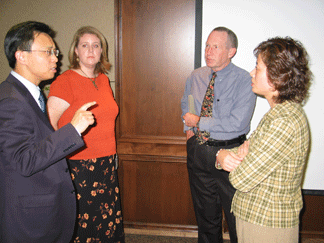 |
From left, Dr. Zheng, Emilie Scoggins, Dr. Moore and Dr. Tang. |
Today, three medical students – Xizhe Ding, Jiayao Lin and Hai Zheng – along with Hongmei Tang, M.D., deputy dean of academic affairs at SJUMS, will become the first exchange personnel from SJUMS to come to the United States as part of the new Asia Pacific Rim Development Program (APRDP). These students also will be the first Chinese medical students to do clinical rotations in the United States and then graduate from a major Chinese medical school under an eight-year American-style training curriculum.
“Shanghai Jiaotong University is one of the finest universities in China,” said Thomas Rosenquist, Ph.D., vice chancellor for research at UNMC. “Our partnership with them means that we have an opportunity to interact positively, for the growth of our research, clinical care and educational programs at the highest level in China.
“China already is a giant in medical research and continues to grow at a breathtaking rate. The initiative of Shanghai Jiaotong University Medical School to adopt a more western-style basis for operation of its institution is a major undertaking. We are pleased that they have selected UNMC as a model.”
SJUMS is one of the leading higher educational institutes in China, as well as a first-class medical university. It is comprised of 10 colleges such as Basic Medical College and Clinical Medical College, six affiliated general hospitals and 15 teaching hospitals, a vocational nursing school and one national key nursing school.
There are more than 12,400 staff members and 9,900 specialists in various fields, including 1,200 specialists with senior professional titles. SJUMS has 26,000 graduates. Currently there are 5,100 students, including 800 graduate students, 3,700 undergraduate students, 60 foreign students and 2,350 continuing education students. Since 1991, the Shanghai Municipal Government has recognized SJUMS as the city’s Model Institute.
The Chinese Academy of Science is the best research institute in China and its graduate school, GSCAS, is among the best graduate schools in China with a long and productive history of collaboration with the international academic and research communities.
There already are common interests in graduate student training, particularly in the areas of cancer biology, genetics and neuroscience. In addition, there is no joint medical/medical research degree program (M.D. and Ph.D.) between China and the United States. The Memorandum of Understanding offers significant opportunities in this area.
“It is exciting to have students and faculty from the APRDP participate in the educational program at UNMC,” said Gerald Moore, M.D., professor, internal medicine-rheumatology and associate dean, UNMC College of Medicine. “The opportunity to have interactions with the students and residents will enrich the education process for both Nebraskans and the Chinese. Nebraska medical students have shown great interest in international rotations. We hope that a similar arrangement can be made through this program.”
The establishment of the APRDP program will help enhance UNMC’s outreach abilities toward China and the Asian-Pacific regions – areas now undergoing massive economic growth. The experiences gained and friendships established through this collaboration will add to UNMC’s stature as a “world class” medical institution, officials say. Ultimately, the efforts, similar to long-term collaborative efforts with European biomedical institutions, will bring more opportunities and academic and economic success to all participants.
“Due to the significant economic growth in China, there is an increased need for the highest quality of medical care for the Chinese people,” said Jialin Zheng, M.D., associate professor, UNMC departments of pharmacology/experimental neuroscience and pathology/microbiology, and director of the APRDP. “The recent establishment of the America-style eight-year training system for medical doctors highlights this trend.
“UNMC has a long-standing history and experience in medical education,” Dr. Zheng said. “This joint program in medical and medical research education will help meet Chinese needs, as well as provide higher quality health care professionals and better medical products for the Chinese people in the future. On the other hand, this effort would enhance our outreach ability and promote UNMC’s mission to build a world class institution in this century.”
“The new eight-year medical students have been chosen through an intensive selection process,” said Dr. HongMei Tang, deputy dean of academic affairs of SJUMS. “The candidates were chosen from undergraduates from first-tier Chinese universities. The interview process only chose about one out of four candidates. The first group selected has 20 students. The first three medical students picked to come to UNMC have been through multiple examinations, interviews and English and other proficiency tests. They are among the best students in China.”
The group was welcomed Oct. 17 with a campus lunch and ceremony. Remarks were made by Rubens Pamies, M.D., UNMC vice chancellor for academic affairs and dean for graduate studies, as well as Dr. Zheng, Dr. Rosenquist, Don Leuenberger, vice chancellor for business and finance at UNMC, Dr. Tang and the three medical students.
“This is the beginning of a very important relationship for UNMC in developing the international relationships that are necessary to our mission of excellence,” Leuenberger said.
For more information about the APRDP, contact Dr. Zheng at 559-5656 or jzheng@unmc.edu or Emilie Scoggins, staff assistant of APRDP, at 559-3791 or escoggins@unmc.edu.